Kevin Clarke
Operetta Research Center
5 January, 2022
The good news is: Daniela Ziegler finally gets to perform Offenbach and star in an operetta. At the Ernst Deutsch Theater in Hamburg the celebrated diva – known for many tv roles and musicals – plays the lusty lead in a new version of Die Großherzogin von Gerolstein, “based on the libretto by Henri Meilhac and Ludovic Haléy”.
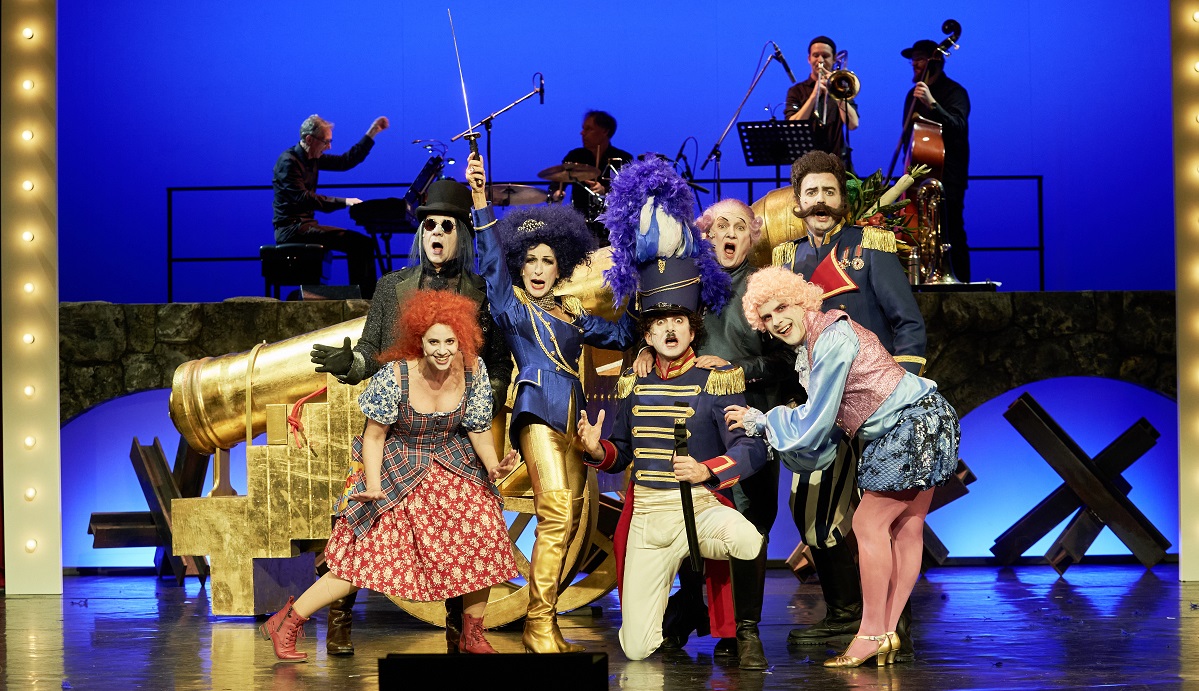
The cast and orchestra of “Die Großherzogin von Gerolstein” at Ernst Deutsch Theater. (Photo: Oliver Fantitsch)
Sadly, this is where the not-so-good news start: this new version by Anatol Preissler, who is also responsible for the staging, is problematic on various levels. Because the Ernst Deutsch Theater is a private venue without orchestra, chorus, or dance group (like most German state subsidized opera houses have), Mr. Preissler had to re-write the three act opéra bouffe to make it playable for four musicians (on stage) and seven actors.
In the past, a similarly reduced version of Gerolstein at Deutsches Theater in Berlin proved that such an approach can work very well. Back in 2002 Dagmar Manzel slipped into the role of the Großherzogin at DT under the direction of Thomas Schulte-Michels. It was an experience seeing this totally over-the-top performance that presented Offenbach as madcap slapstick – with grotesque exaggerations, biting humor, and a heroine that was out of control in the best – and most scary – possible way.
That performance kickstarted the singular operetta career of Miss Manzel and led her to Komische Oper and Barrie Kosky. The rest is history, as they say.
Daniela Ziegler has comparable acting chops, she has a far better singing voice (she was a celebrated Evita in Vienna and Berlin, Norma Desmond, and she was seen many other big parts), she has a highly characteristic speaking voice, and she can certainly play slapstick with a wicked twist. The poster for the new Hamburg production hints at that – showing Ziegler as a deranged “elderly” lady, looking provocatively at the spectator. As if saying: “Do you have a problem?” (“If so, f*** off.”)
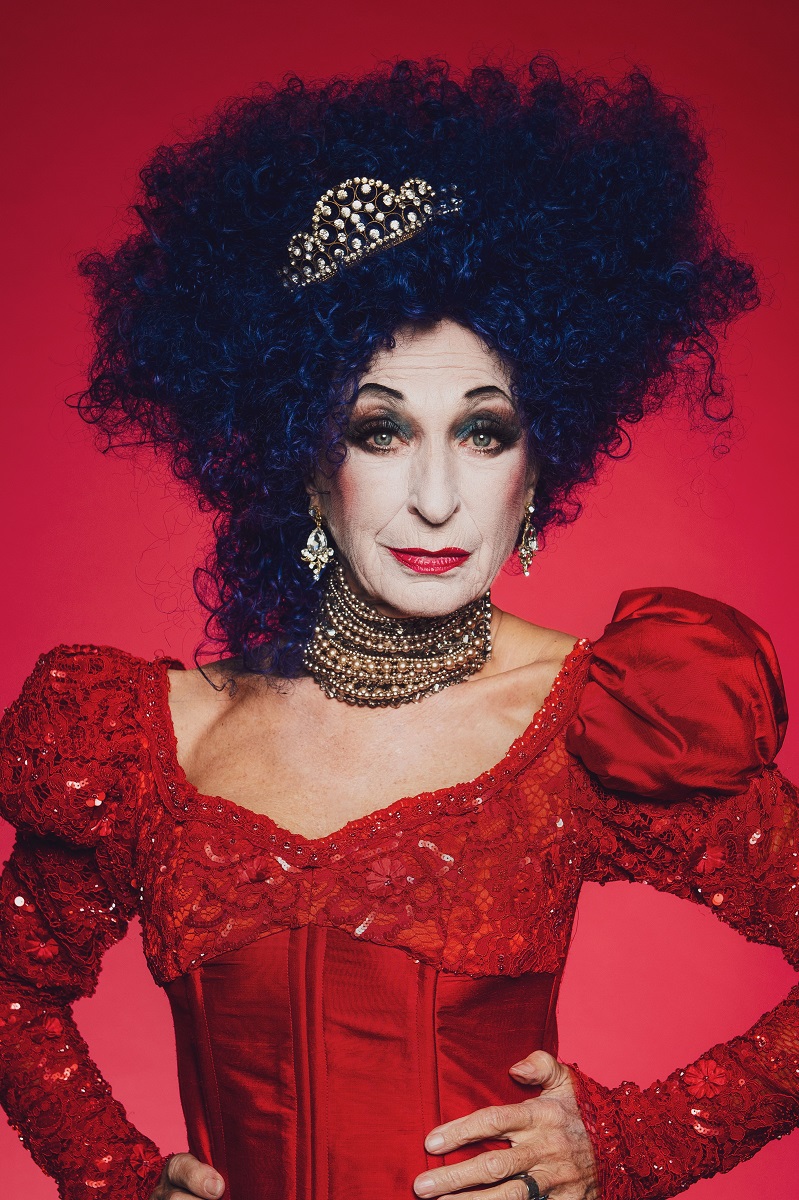
Daniela Ziegler on the poster for the new “Großherzogin von Gerolstein” at Ernst Deutsche Theater. (Photo: Timmo Schreiber)
On stage, Miss Ziegler and the rest of the cast seem to interact in a sort of “Offenbach Gone Mad” way, with comedian Mark Weigel as a Charlie Chaplin type Fritz and with Jan Rogler as a campy Prince Paul who steals the show from everyone, except from Ziegler of course, who stays “on top”.
The problem is that the translation and especially the staging lacks any kind of bite. It’s reminiscent of the famous German tv show Klimbim which aired in the 1970s and showed a crazed German family in the most absurd situations. Elisabeth Volkmann was the sensationally sensuous mother, and Ingrid Steeger was her oversexed daughter. Now, in Gerolstein, Ziegler and Dagmar Bernhard as Wanda sometimes seem like copies of the famous Klimbim characters. Especially in the moments that work well.
But while Klimbim pushed boundaries of sexual (and political) propriety in post-war Germany, the new Gerolstein as staged by Anatol Preissler seems scared to try anything like that. Instead, Preissler opts for a laid back humor that misses almost every joke Meilhac and Halévy put into their original script. Replacing them with new jokes whose effectiveness is debatable. (There are no English supertitles in this German language production.)
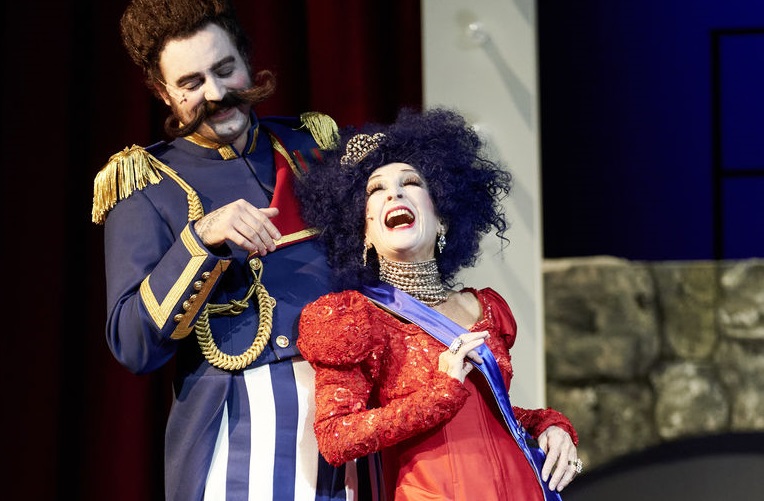
Daniel Schütter as General Bumm and Daniela Ziegler as the Großherzogin von Gerolstein at Ernst Deutsch Theater. (Photo: Oliver Fantitsch)
On top of that, Preissler puts his actors onto the small empty stage and leaves them to their own devices. Since they are experienced stage animals – with careers in cabaret, stand-up comedy and musicals – they manage to salvage the production from total nothingness. But: it truly is a missed opportunity to show the world how much better suited for Offenbach such a cast can be, as opposed to the “traditional” opera house casting seen and heard elsewhere.
Also, re-arranging Offenbach in a sort of easy-listening jazz version (conducted by Tjaard Kirsch) takes the punch out of almost every musical number. And that, too, is a missed opportunity. Especially when the singing of Ziegler is this punchy!
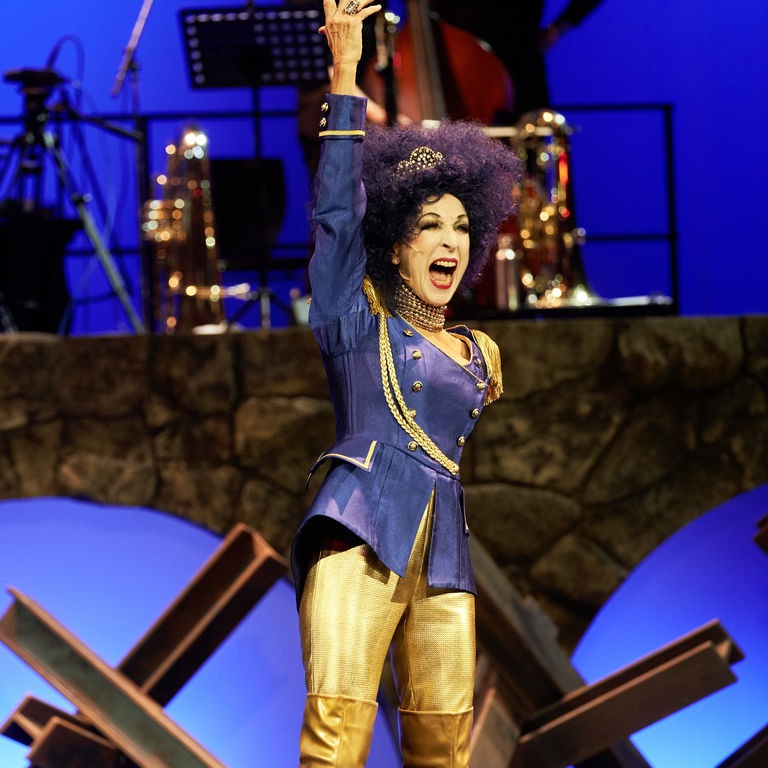
Daniela Ziegler with the sword of her father in “Großherzogin von Gerolstein” at Ernst Deutsch Theater. (Photo: Oliver Fantitsch)
Still, it’s a performance worth seeing because Daniela Ziegler makes you understand why she should be doing more operetta and why it’s a brilliant idea to have a 74-year-old performer demonstrate that playing operetta-heroines-in-search-of-love isn’t just for the young and innocent looking. Perhaps venues such as Staatsoperette Dresden or Musikalische Komödie Leipzig will find a better director for Ziegler in the future? She certainly is a knockout Grand Duchess and an ideal Offenbach interpreter who can play with words and double entendre. She’s also a worthy heiress of Hortense Schneider in terms of palpable sex appeal, not just when she rides an oversized canon or sings “Dites-lui” to Fritz. And she can really act!
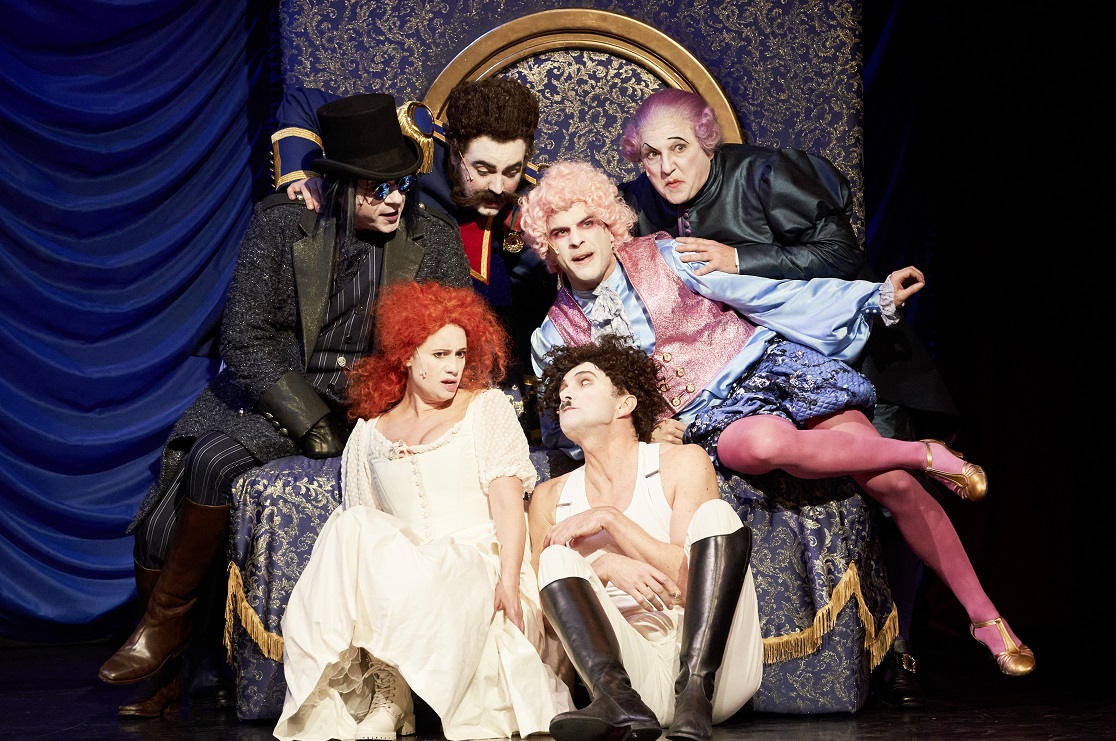
Oliver Warsitz, Dagmar Bernhard, Daniel Schütter, Jan Rogler, Mark Weigel and Frank Jordan (left to right) in “Die Großherzogin von Gerolstein” at Ernst Deutsch Theater. (Photo: Oliver Fantitsch)
It’s interesting to see, by the way, which Offenbach shows are currently brought back and why. At Theater Pforzheim Die Insel Tulipatan was recently presented in a “new version” by Stephanie Kuhlmann and Inken Meents with “a focus on LGBTQIA+ themes”. In a press statement Meents explained that they turned Théodorine into a “asexual” a “aromantic” character. Which would be a first in operetta history.
The production is marketed “for young adults, age 10 and older”. If you go to the theater’s homepage and read the synopsis of Tulipatan you will notice, however, that key elements of the “queer” story are left out that make the LGBTQIA+ aspects of the piece understandable and interesting in the first place. Which demonstrates, in a way, that modern stage directors don’t seem to take these libretti seriously. Reducing them to a kind of nonsense, but thereby killing the congenial original nonsense that functions like clockwork.
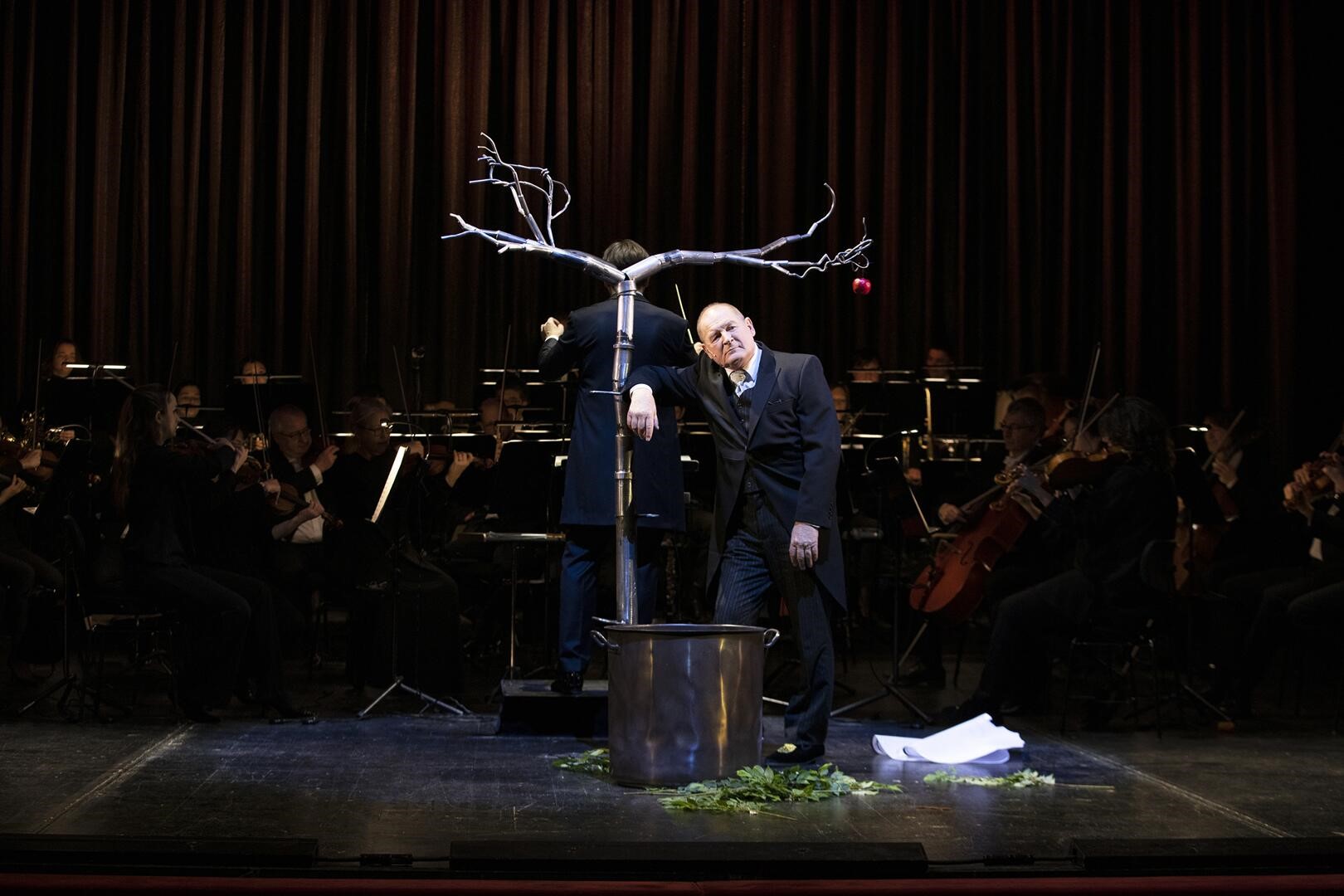
Burghart Klaußner as the narrator in “Oyayaye” at Komische Oper Berlin. (Photo: Barbara Braun)
At the theater in Brandenburg, meanwhile, a new Ba-ta-clan premiered. And at Komische Oper Offenbach’s one-act Oyayaye – about a contra bass player stranded on a island inhabited by cannibals – was presented at Christmas in a semi-staged concert version (with English subtitles). The miraculous realization at that performance was that the craziest moment – Queen Oyayaye singing a bel canto aria to a laundry list text – was the highlight of the evening, because Hagen Matzeit sang Oyayaye in a counter tenor voice that switched to butch baritone and back again. It was a master class in operetta singing which brought the house down.
At his side, there was Ferdinand Keller as the contra bass player “Schrubb-dich-wund”. Mr. Keller is part of the “queer operetta collective” tutti d*amore. To see him on stage at Komische Oper, instead of the usual off-scene venues the tuttis perform in, proved that the queer operetta revolution at Komische is open for new talents – even in the post-Kosky era. The new translation of Oyayaye (“Eine musikalische Menschenfresserei“) by Daniel Hirschel was fabulous and everything Antol Preisser’s Gerolstein was not.
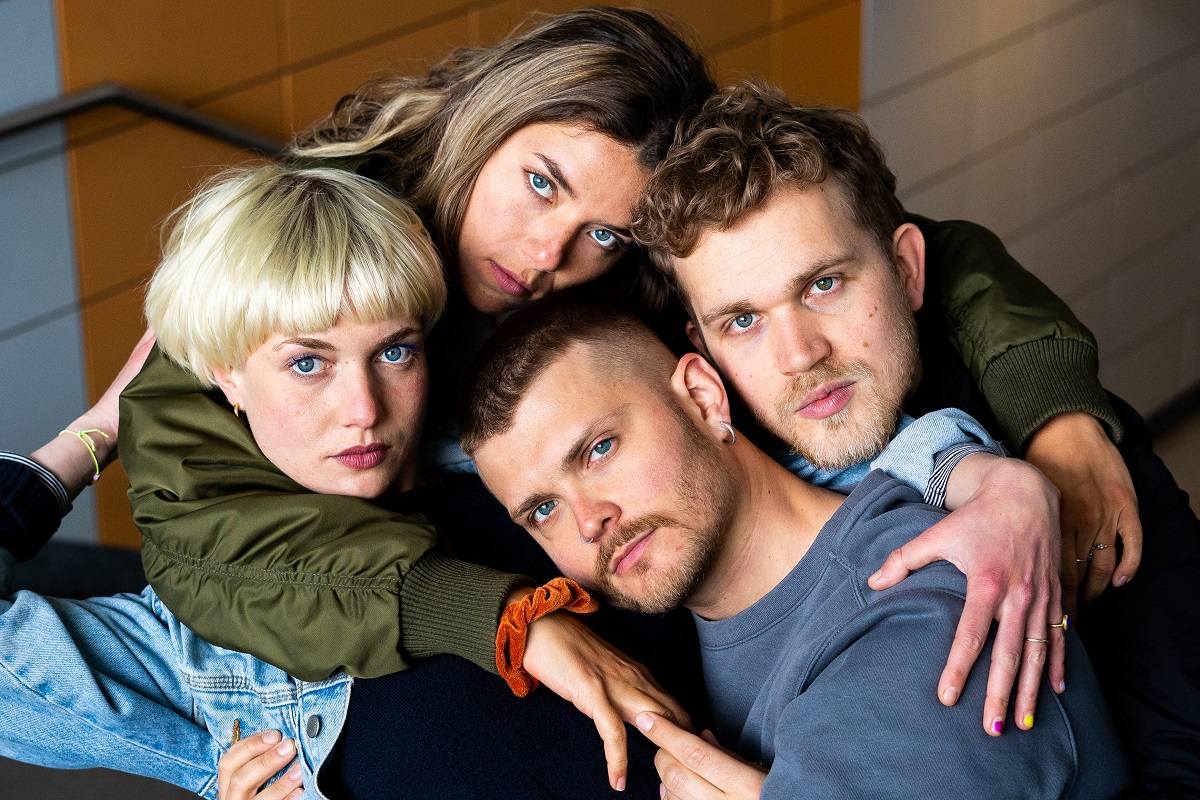
The tutti d*amore collective with Ferdinand Keller (right). (Photo: Nicola Fegg)
As a second part of this one-acters double bill Fortunios Lied was presented, Burghart Klaußner was the narrator and interpreter of the title role. Hagen Matzeit returned as Babette, Fortunio’s cook, and Alma Sadé sang a charming Maria, Fortunio’s wife who he thinks betrays him with the clerk Valentin (sung by Susan Zarrabi without any understanding of the text). Adrien Perruchon conducted the concert with a down-sized orchestra, Max Hopp was in charge of the minimalistic, yet effective staging.
So, there’s a whole lot of Offenbach to digest at the moment. There are very contrasting approaches to his works, and there seems to be a new interest in his lesser-known titles. It’s worth discussing which approach has the potential to lead to way into the future and which of these “forgotten” shows have something to say to us today.

I agree completely with Dr Clarke. Tasteless were hints regarding the war in the Ukrain in Gerolstein